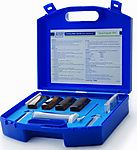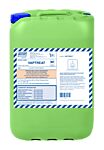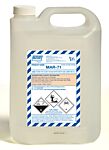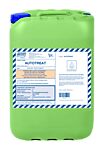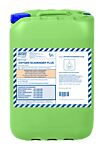


Last updated: 06/02/2024 08:56:28
ENGINE WATER TREATMENT25 LTR(9108)
Product Code
- Product group:
- 653
- Product number:
- 777703
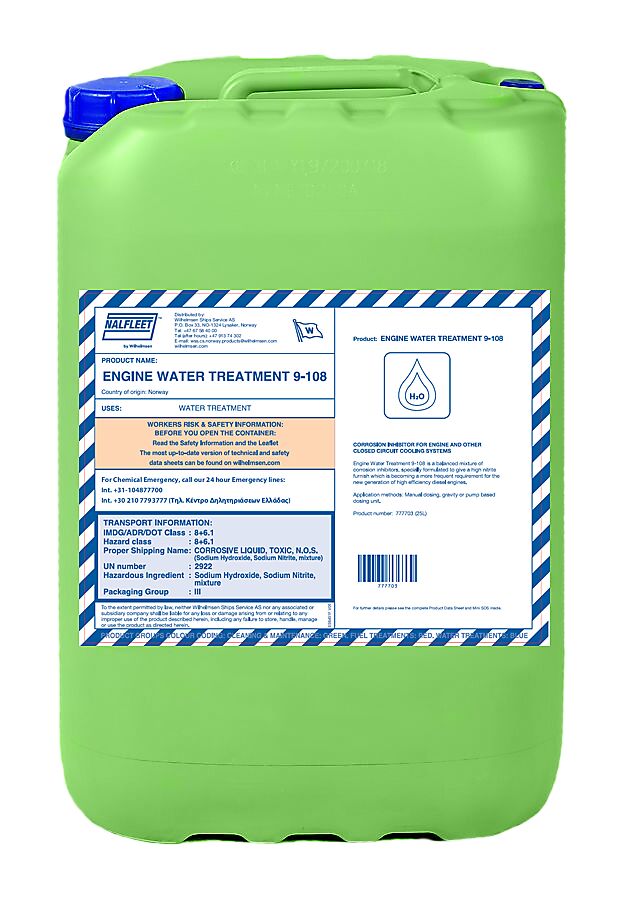
NALFLEET™ Engine Water Treatment 9-108™ is a balanced mixture of corrosion inhibitors, formulated to give a high nitrite furnish which is becoming a more frequent requirement for the new generation of high efficiency diesel engines.

Product information
This product supersedes product no: 777045
Use SpectraPak 309 Test Kit 739466 to test and control Nitrite, Chloride and pH of your engine cooling water.
Features
- Contains dispersant for cleaner and more efficient cooling systems
- Does not affect gaskets or hoses
- Compatible with glycols for frost protection.
Benefits
- Approved by major diesel engine manufacturers
- Simple control test
Specification
General
| Invent Hazard Material (IMO/EU) classification | C-7 |
|---|
Physical properties
| Appearance | Light Yellow |
|---|---|
| Density [g/ml] | 1.3 |
| Form | Liquid |
| pH | 13.2 - 14.0 |
Approvals
- Approved by all major engine manufacturers
- Approved by the UK Dept. of Transport for use in diesel cooling systems where heat from the cooling water is used for distilling sea water for domestic purposes in evaporators on board
- Gold approval by CEFAS for use in the UK and Netherlands offshore petroleum industries.
Safety Data Sheet (SDS)
Documents
Directions for use
NALFLEET™ Engine Water Treatment 9-108 is effective in hot and cold water and it is compatible with Glycol when used with anti-freeze. It contains an anti-scalant to minimise scale formation on heat transfer surfaces. It will protect all metals commonly found in engine cooling water systems including cast iron, mild steel, copper, copper alloys, lead and solder.
For general guidance where aluminium is present:
No aluminium present - Use Rocor NB Liquid or Engine Water Treatment 9-108
With aluminium - Use NALFLEET 2000 or Cooltreat AL
Dosing Method
Before start up of treatment the system should be flushed to remove all sludge and particulate matter and where necessary cleaned with an oil remover, such as UNITOR™ Commissioning Cleaner 624932 to remove oil and grease deposits.
NALFLEET™ Engine Water Treatment 9-108 should be dosed directly to the cooling system.
Sampling and Testing
The WSS Test Kit provides the necessary equipment to carry out the control tests. Obtain a representative sample of the cooling water. Carry out the tests immediately after sampling (following the instructions given in the Test Kit) and log the results in Waterproof. The results should be sent to WSS as stated in the Waterproof instructions. It is important that testing is carried out at least once per week, to ensure levels of treatment are correct.
Dosing and Control
Part A: Control Guideline and dosage
Nitrite Control limits for EWT 9-108: 670 - 1,000 ppm nitrite (as NO2), recommended routine maintenance nitrite residual = 800 ppm (as NO2) The nitrite (as NO2) control guideline and dosage for EWT 9-108 as below
1.Minimum = 670 ppm and required dosage of EWT 9-108 = 2.2 L/m3
2.Maximum = 1,000 ppm and required dosage of EWT 9-108 = 3.4 L/m3
3.Recommended (routine maintenance) =800 ppm, and required dosage of EWT 9-108 = 2.7 L/m3
Note:
·To increase nitrite residual by 100 ppm, required dosage of EWT 9-108 = 0.3 L/m3 of distilled or technical water
·Above mentioned product dosage is an estimation only system required dosage may varies due to water quality, system demand, and other variations.
Part B: Working examples of dosage estimation:
·New cooling system ( e.g.Nitrite residual = 0) : Recommended dosage is 2.7 L/m3, 800 ppm nitrite.
·Existing operating cooling water system (e.g. some nitrite residual presence but below recommended guideline): Assuming system measured nitrite residual at 600 ppm and to increase nitrite residual to 800 ppm, required nitrite = 200 ppm = 0.6L of EWT 9-108 is needed.
Part C: General Application Notes
1.The engine manufacturer's recommendations for water quality should always be complied with.
2.Chloride levels should always be as low as possible. Most engine manufacturers recommend a maximum of 50 ppm chlorides.
3.For this reason, Wilhelmsen Ships Service recommends the use of distilled water as make-up.
Related products
Is accessory to
Test Kit for Nitrite, Chloride and P Alkalinity.

